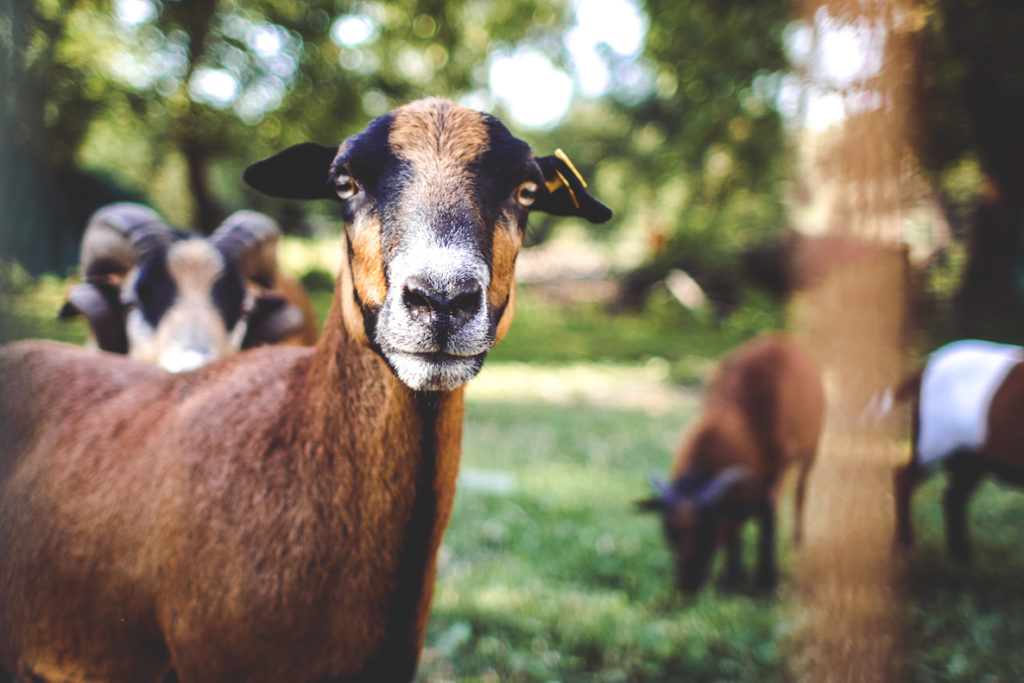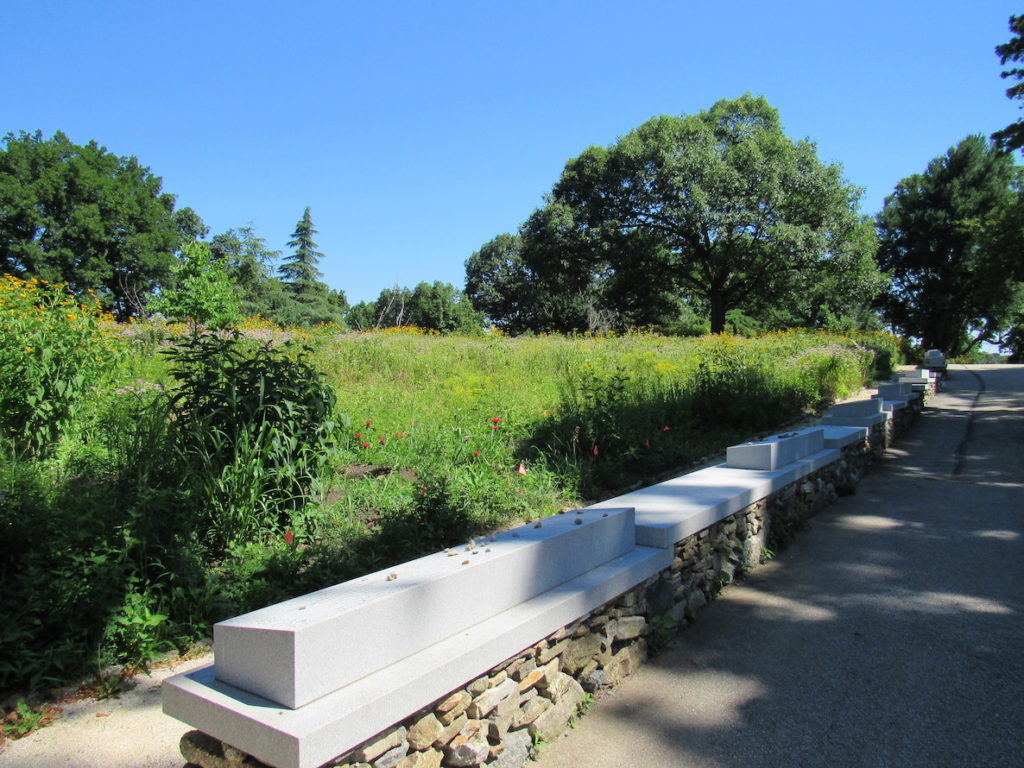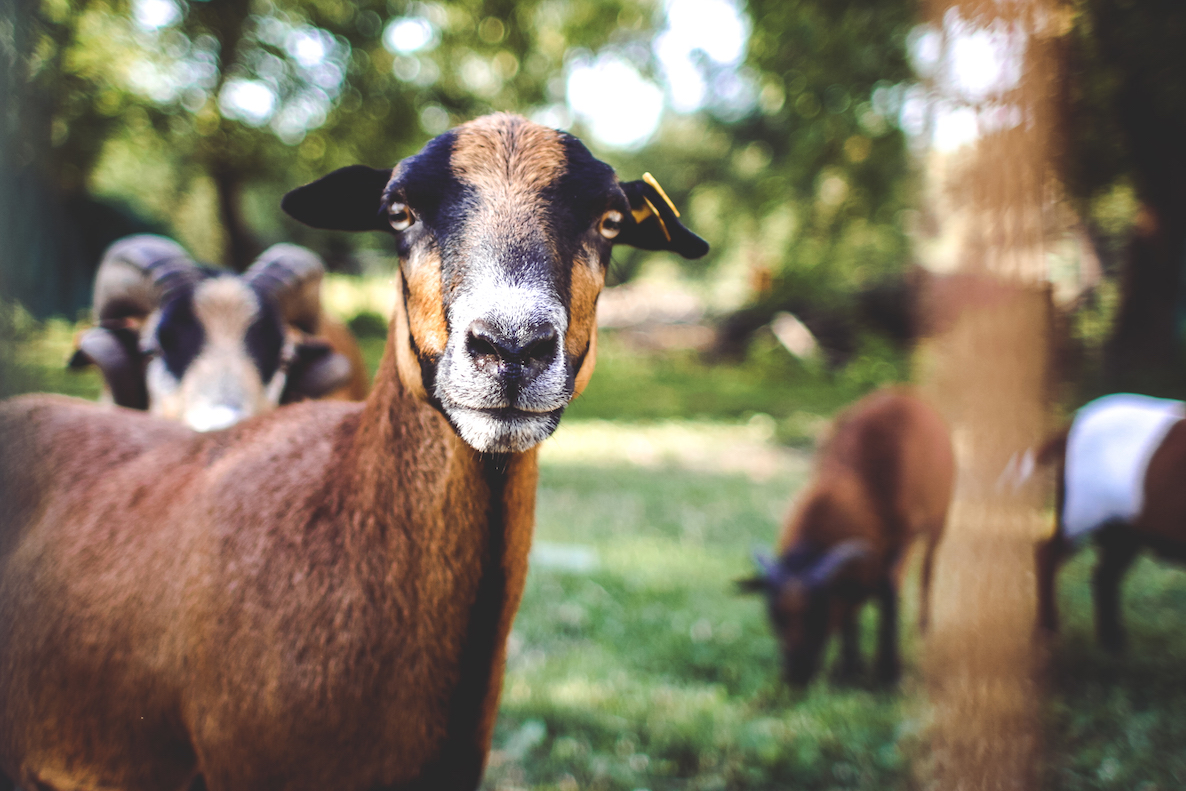Visit West Laurel Hill Cemetery on a Wednesday afternoon and you’ll find the usual memorable sights we’ve come to expect from one of the Philadelphia area’s most magnificent historic graveyards: grand mausoleums; beautiful and weird sculptures marking moments in time; tree-lined lanes winding amidst notable graves for everyone from Mother’s Day founder Anna Jarvis to David Garroway, the first anchor of NBC’s Today Show.

Prefer the audio version of this story? Listen to this article in CitizenCast below:

![]() But show up at the right time and you also might find yourself face to face with…goats? Goats. Running through the grass, snacking on leaves and dandelions, doing what goats do. And they’re not there by accident, either. Led on leashes by handlers, the 10 or so goats are natural lawn mowers working at West Laurel Hill’s groundbreaking green burial site, Nature’s Sanctuary.
But show up at the right time and you also might find yourself face to face with…goats? Goats. Running through the grass, snacking on leaves and dandelions, doing what goats do. And they’re not there by accident, either. Led on leashes by handlers, the 10 or so goats are natural lawn mowers working at West Laurel Hill’s groundbreaking green burial site, Nature’s Sanctuary.
Stretching two-thirds of an acre, Nature’s Sanctuary abandons manicured lawns in favor of allowing wildflowers and grasses to grow over the graves. Instead of tombstones, there is a single wall overlooking the trail where the names of the people buried there are inscribed. The landscape is designed to evolve naturally, from a meadow filled with regional flowers to a forest filled with native plants. The goats keep the invasive species at bay without releasing natural gas into the atmosphere.
Replacing traditional lawn mowers with goats is just one of 50 sustainability initiatives launched at West Laurel Hill since 2016, ranging from updating light fixtures to use LED bulbs, to creating rain gardens and tree management plans, to keeping bee apiaries on the grounds to help keep the area pollinated—all part of the efforts that have made the Bala Cynwyd cemetery the most eco-conscious in the country.
“The role of cemeteries is quickly changing as demographics and preferences about burial change,” Goldernberg says.
“Nature’s Sanctuary is our most successful demonstration of sustainability to date,” says President and CEO Nancy Goldenberg. “No machinery is used on this site, which means less energy and cleaner air. Economically, we are fulfilling a growing and valuable need of our customers, while enhancing our reputation. And we are creating resiliency to swings in trends and market forces.”
It might seem that graveyards are inherently green—they are, after all, green places with grass, flowers and trees. In truth, the burial industry is bad for the earth in many ways: More than 800,000 gallons of formaldehyde, a key chemical in embalming, enter the earth each year due to human burial practices. And formaldehyde isn’t the only chemical entering our earth as a result of human burial. Phenol, methanol, and glycerin are all involved in the embalming process and the chemicals used to keep cemetery lawns green and pristine also pollute the environment when they seep into the soil, contaminating the water supply, and killing native species.
West Laurel Hill contributed to this problem until 2008, when a board member, Cliff David, urged the cemetery and funeral home to change course. David’s full time job was serving as president of the Heritage Conservancy, a regional land-based trust in Doylestown that is dedicated to preserving the environment. He wanted to bring those values to West Laurel Hill.
According to Goldenberg, David introduced to West Laurel Hill the now increasingly common idea of a “triple bottom line,” in which people, planet and profit are treated equally. This launched the decade-long effort that led, eventually, to Goldenberg being hired in 2018, the same year Nature’s Sanctuary won a SITES Gold Medal for landscape sustainability. (SITES awards, which are awarded by the American Society of Landscape Architects and the Green Business Certification, recognize landscapes for their sustainable practices.)
A Penn-trained city planner, Goldenberg has spent her career beautifying Philadelphia’s public spaces, from stints at the Center City District, the architecture firm Venturi Scott Brown, the Pennsylvania Horticultural Society and others. She has long championed the outdoors as a means to engage Philadelphians—from bringing Outward Bound to Philly under Mayor Michael Nutter to serving as chair of the Commission on Parks & Recreation, to helping launch the renovation of Dilworth Plaza.
![]() Goldenberg never expected her career trajectory would land her in a cemetery, of all places. But in West Laurel Hill, she found a blend of her passions for history, art, landscape design, nature, recreation and helping people. “The role of cemeteries is quickly changing as demographics and preferences about burial change,” Goldenberg says. “The more I read and learned about the industry, the more fascinated I became. This position affords me the chance to introduce and implement innovative ideas and help others to view cemeteries as much more than burial grounds.”
Goldenberg never expected her career trajectory would land her in a cemetery, of all places. But in West Laurel Hill, she found a blend of her passions for history, art, landscape design, nature, recreation and helping people. “The role of cemeteries is quickly changing as demographics and preferences about burial change,” Goldenberg says. “The more I read and learned about the industry, the more fascinated I became. This position affords me the chance to introduce and implement innovative ideas and help others to view cemeteries as much more than burial grounds.”
In the last year, West Laurel Hill has expanded its sustainability efforts to include a pet cemetery, built from stones recycled from their other cemeteries. The pets are buried in urns made from recycled lumber. They’re cremated using a water-based process called aquamation that releases zero greenhouse gases and has only 10 percent of the carbon footprint that flame creation does.
While aquamation hasn’t been approved for use on people in Pennsylvania, in 2010 West Laurel Hill updated its human crematorium to be more environmentally friendly. This upgrade has decreased visible emissions from 80 percent to 10 percent.
No caskets are required for burial in Nature’s Sanctuary, which allows bodies to decompose naturally and give back to the environment. If people choose to bury their loved ones in a casket, it must be biodegradable. While most people who are buried in Nature’s Sanctuary are not embalmed, West Laurel does offer an eco-friendly embalming option that is certified by the Green Burial Council. The lack of a casket and embalming cuts down funeral costs for families as well, making green burials cheaper than the traditional funerals and cremation. Since offering the option in 2008, West Laurel Hill has seen increased interest each year from consumers.
The sustainability initiatives at Nature’s Sanctuary go hand in hand with West Laurel Hill’s community out-reach initiatives, aimed at helping Philadelphians become more environmentally conscious. These efforts include promoting biking through the cemetery, partnering with scientists from the Academy of Natural Sciences and local birders for bird-watching tours, and a volunteer garden program they’re piloting this year.
It might seem that graveyards are inherently green. In truth, the burial industry is bad for the earth in many ways: More than 800,000 gallons of formaldehyde, a key chemical in embalming, enter the earth each year due to human burial practices.
These activities allow people to learn about both the environment and the history of the cemetery, which is one of the oldest in the nation. At the weekly summer goat walks, for instance, a member of the Philly Goat Project educates the group on the role the goats play in sustainability while an employee of West Laurel Hill shares stories from the cemetery’s history.
Founded in 1869 as the sister cemetery to Laurel Hill on the other side of the Schuylkill River, West Laurel Hill was created after Quaker and librarian John Jay Smith fell in love the rolling hills and strong trees that stretched over the land. Now that they have embraced sustainability, the cemetery is preserving the land that Smith fell in love with while also educating today’s citizens on how their impact on the environment lives on after death. “We had many families come to us, expressing interest in green burial, wanting to become part of the earth’s perpetual legacy,” Goldenberg says.
![]() She saw this firsthand on her first day at West Laurel Hill, when a friend called to tell her that she knew someone who had recently passed and was being buried in Nature’s Sanctuary. She told Goldenberg that the husband of the woman who had died wanted to celebrate her love of gardening. Goldenberg knew just how Nature’s Sanctuary could help them achieve that.
She saw this firsthand on her first day at West Laurel Hill, when a friend called to tell her that she knew someone who had recently passed and was being buried in Nature’s Sanctuary. She told Goldenberg that the husband of the woman who had died wanted to celebrate her love of gardening. Goldenberg knew just how Nature’s Sanctuary could help them achieve that.
“With him and his family, we developed a plan for her garden club colleagues to come to West Laurel Hill in the spring and plant some of our empty urns and cradle graves, followed by a luncheon to commemorate her life,” she says. “Nearly 100 gardeners showed up with trowels in hand and helped beautify our cemetery while remembering a friend. It was truly a way to celebrate the life of a wonderful woman, connecting to what she truly loved—gardening.”
Photo courtesy Viktor Hanacek / picjumbo





